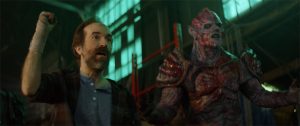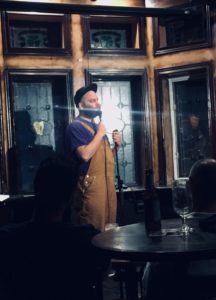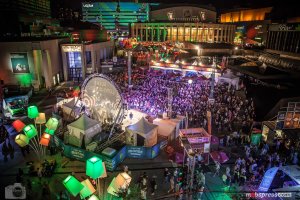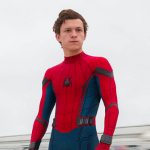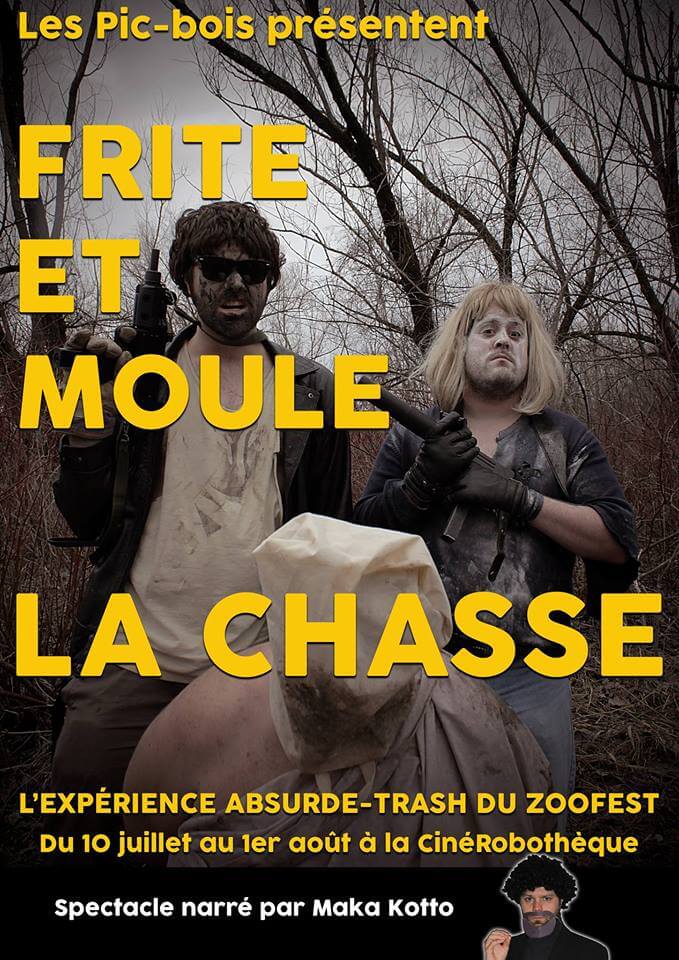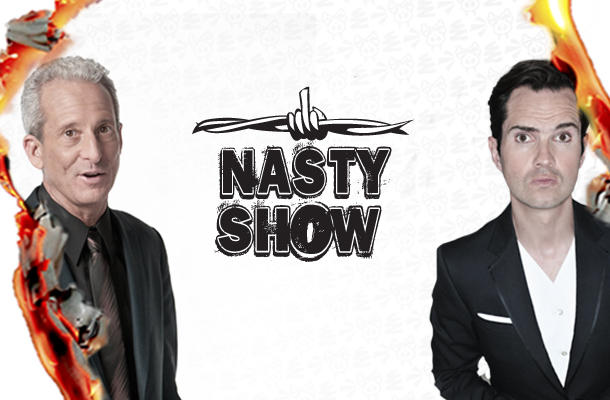Chatting with Comedian Ryan Hamilton
This month, stand-up comic Ryan Hamilton is returning to Montreal for the 2017 Just For Laughs Festival. Having become a favourite on both the U.S. and Canadian stand-up scenes, he has made memorable appearances on The Late Show with Stephen Colbert and Conan. The title of his upcoming JFL show, Edgy, Boundary-Pushing Comedian, is a tongue-in-cheek reference to his clean brand of observational humour that has earned him several accolades; he has won The Great American Comedy Festival and was named one of Rolling Stone’s Five Comics to Watch in 2012.
The comedian took the time to talk with us about his early days doing stand-up, his transition from a small town in Idaho to New York, and his upcoming Netflix special, Happy Face, which will be released on August 29th. Check out the interview below:
First off, I saw a YouTube comment that referred to you as a mix of Jerry Seinfeld and Brian Regan. Were they big influences on you and is that the kind of tone you’re going for?
Well, I definitely do admire them both so, so much, but I really don’t know what I’m going for. I wouldn’t say I’m trying to be a mix of anybody in particular. I’m just trying to be me, really. Trying onstage to be authentically who I am offstage, in a funny way. So that’s what I’ve always tried to go for, but I always watched everything that both of those comedians did. I grew up watching Seinfeld and, once I discovered Brian Regan, became a huge fan, so yeah for sure, I’d say they’re influential. But as far as who I’m trying to be, I’m just trying to be myself as much as I can.
Was that true when you were first starting out?
You know, when you’re first getting on stage, maybe the first year, you’re just walking around in the dark bumping into things, and trying to experiment so broadly. You go from one style to another style just to see what works. You’re just trying to get what fits for you, so I would say in the beginning I was probably most like Mitch Hedberg. Very absurd, kind of surreal one-line type of things. I just kind of eventually got a little more comfortable on stage– I started becoming a little more physical, a little more conversational, just because that seemed to be what felt natural to me. But yeah, I started more in that kind of Mitch Hedberg, Steven Wright area in the very, very beginning (chuckles).
You started off your career in Utah, right? What was the scene like back then, and was that big change for you, going from Idaho to Utah?
It was, actually. I’m from a very rural town in Idaho, about 1000 people, very small farming town. So I started comedy in Salt Lake City, which to me was a big city, and it was the nearest major city to me.
[sirens blare in background]
Excuse the sirens, it’s just a part of life (chuckles).
Nah it’s fine. I’ll assume they’re not for you.
So yeah, it was a great scene. It was very supportive, and it wasn’t very big. And there was a club that opened about 6 months after I started called Wiseguys, which is still there– and it was great, because I started just before the club opened, and then the club opened, and they were in need of comedians to support these headliners they were bringing in, so I was getting a lot of really good weekend time pretty early in my life as a comedian, which is pretty rare. So it worked out great for me. For the size of the scene, there was a lot of good stage time, and a lot of great comedians coming through.
Did you do any stand-up back in Idaho? Was there any sort of scene there at all?
No, there was no scene at all. I had only seen stand-up comedy on television, and I think the nearest comedy club was, like, 4 hours away– like, an actual comedy club. There was a place that had comedy in a bar that was an hour away. I remember seeing it on the marquee when we would go that city; that’s where we would go to watch a movie or do our school shopping (chuckles), or whatever we needed to do. I remember when I was young seeing “Comedy” on this marquee, but it was a bar, so I couldn’t get into it anyway.
When I was young, I wanted to be newspaper columnist; I wanted to have a humour column like Dave Barry. I read Dave Barry’s column every week and I just really thought that was the greatest job in the world. And I also really loved the Parkside cartoon strips, so these things from the newspaper really influenced me comedically. I was drawn to them, and then when I was 12 or 13, I started watching An Evening at the Improv on cable television. Watched it every week and loved it, and started discovering late night TV, and my parents would wake me up when there was a comic on Carson, Leno, or Letterman. Then I started watching Letterman every night, and that’s kind of where it started for me.
I actually did comedy a few times when I was 18 as a freshman in college. I was a broadcast journalism major, had a radio show with some friends, and we were interested in comedy, so we put together these stand-up comedy shows having never been to one and never trying comedy, but we were just interested in it. So I did it a few times in Idaho when I was 18, but I didn’t do it again for another 5 years, maybe.
You went to college to study public relations and journalism, so you were on your way to kind of doing what you said you wanted to as a kid. What made want to go back into stand-up?
Yeah, it’s interesting. You know, I was always working in journalism. When I was in highschool, I asked my local paper if i could have a column. They gave me a column, so I started writing, and then I got involved in TV in the sports department at this affiliate station an hour away from where I grew up. I had always had a job in PR or journalism all through college, and I switched my major to PR because I’d had enough exposure to broadcast journalism that I thought, “That is an unstable life.” This is really what changed my mind (chuckles). And then I switched over to PR, and I really loved the psychology behind it, and I loved studying it. It was fascinating to me, and I just really got into the academics of PR. I got a job at an ad agency for a year, and I just kept wanting to do comedy. As soon as I got out of college and had a little time, I just hung out in comedy clubs and went up as much as I could. About a year into my job at the ad agency, I got laid off, and I started looking for another job. I was kind of disillusioned creatively with where I wanted be, so I started doing more and more comedy. I put off my job search and thought, “I’ll do comedy for a year and see what happens.” And I just went all in for a year, and then I thought, “Let’s try another year! See what happens.” That’s kind of how it started for me.
It must have been kind of daunting going from something stable to stand-up. Like, you chose the hard way.
[laughs] It was an experiment to me, really. I’d had a fair amount of freedom. I didn’t have a lot of money, but I also didn’t have a lot of debt. I also was single. Wasn’t married or anything, so if it failed, I knew that it only affected me, and I kind of had in the back of my mind, “I can always go back and get another job, but I think my opportunity for this is now, so let’s try it.”
So you live in New York now?
Yeah, I’ve lived in New York for over ten years now.
So why New York over somewhere like LA? They’re the two biggest North American stand-up centers, so what was the reasoning behind choosing one over the other?
Well it’s interesting; I don’t really know. Even at the time, I came here– I’d never been here, and I came here for a couple of days to a set for a show on Comedy Central. I was here for just two or three days. I was at a point in my career where I was living in Salt Lake City doing comedy full-time, and thought, “I’ve done everything I can do here. I need to move.” I probably had more going on in LA, but in the back of my head, I was very intrigued by New York. I wondered if I could do it, really. I was really curious about it, so I just got a sublet for a few months and then ended up staying, and just loved it. I knew it was good for stand-up over LA. I think there was a lot of stage time, which was important to me.
Right, I keep hearing comedians talk about being able to hit 10 clubs a night in New York, just working and working.
Right, it’s a little more compact and easier to get around. You can hop on subway and hit a few different clubs in a night. In LA, that’s very difficult to do, and there are fewer clubs with more people vying for stage-time. That all adds up to, for me, a more creative experience in New York where I can constantly try stuff. You know, it’s still competitive here and it’s hard to get onstage, especially when you move– it feels like you’re starting over. It took years for me to get regular spots at the clubs, but I still think it pushed me in a way that LA wouldn’t have been able to.
Your first hour-long stand-up special is premiering on Netflix next month. Where did you record it?
In New York. It was important to me to record it in New York. I really like that my experience coming from Idaho resonates well here, and I have a lot of material about that.
Do you think the Internet has helped your career? On one hand, comedians now have a platform that allows them to build an audience more easily, but there’s also so much content out there that it’s hard to be heard.
We’ll see what happens. This is kind of my first big foray into that kind of exposure. I think there are good things and bad things about it. I mean, I think comedians put things out way too early now. That can hurt you later on, and I’m constantly trying to protect my material and not put it out until I absolutely have to (chuckles), which sounds kind of weird. It just gets better and better, you know, the more you work on this stuff. It’s always a work in progress. There’s this compulsion to just put stuff out, and I think some comedians develop an aptitude to develop stuff quicker, and people are on different timeframes on how they develop stuff. I think as long as if you feel like it’s where you want it to be, that’s great, but I feel like I like to hone and work on stuff until I’m really happy with it, so I kind of fight that pressure to put out a lot of stuff. I’d rather put a few things that I feel are great than a lot of things I feel aren’t completely ready.
You’re coming back to Montreal this summer, and you’ve been here several times before. What do you think it is about your material that makes it resonate with Montreal crowds?
That’s an interesting question. I don’t know. I mean, I hope people respond to it well. I always have a great time at the festival. The audiences are great. It’s funny, in the comedy community, it’s not uncommon that people would think I’m Canadian (laughs). I don’t know how Canadians feel about that, but I think that Americans often think it. I don’t know why. I have a kind demeanor, I think? Maybe it’s because I’ve worked in Canada so much.
But I always have a great time and love the audience there, and Montreal just loves good comedy on any part of the spectrum, because they’ve had the festival so long. They just really have been exposed to so much.
I think we also appreciate small town stories, you know? I think enough people here have experienced a mix of rurality and urbanity that it helps them relate to your material.
Okay, yeah! That makes sense.

